Understanding Tax Transcripts – A Comprehensive Guide

Your Comprehensive Tax Transcript Handbook: Discover an in-depth overview of IRS forms, practical insights, and valuable knowledge for informed financial decision-making.
What Are Tax Transcripts?
A tax transcript is a comprehensive document provided by the IRS that offers a summary of your financial history, including income, tax returns, and adjustments made. It serves as a crucial record for businesses and individuals, aiding in various financial and compliance-related decisions.
What are the different types of tax transcripts?
There are five different types of tax transcripts:
Tax Return Transcript
This transcript provides a summary of the information entered on your original tax return. It includes details about your income, deductions, credits, and any other information you reported on your tax return. It’s often used for tasks like verifying income when applying for a loan.
Tax Account Transcript
The Tax Account Transcript contains information about your filing status and adjusted gross income. It also shows any changes or amendments made to your tax return. Lenders and financial institutions may use this transcript to confirm your financial status.
Record of Account Transcript
This transcript combines the information found in both the Tax Return and Tax Account transcripts. It offers a comprehensive overview of your tax-related data, making it useful for various financial and tax-related purposes.
Wages and Income Transcript
This transcript focuses solely on the income section of your tax return. It provides a detailed breakdown of your sources of income, including wages, interest, dividends, and other sources. This information can be helpful for verifying your income for specific purposes.
Verification of Non-filing Letter
This document is used to prove that you did not file a tax return for a particular year. It can be necessary when applying for certain types of financial aid or loans, as it confirms your non-filing status.
Understanding these different types of tax transcripts is crucial as they serve various purposes, and knowing when to use each type can streamline financial processes. In this comprehensive guide, we will explore the role of IRS Form 4506-C, shedding light on their unique significance and use cases in accessing tax transcripts.
IRS Form 4506-C: The IVES Request for Tax Transcripts
IRS Form 4506-C, or the “IVES Request for Tax Transcript,” is a document issued by the IRS. This form enables authorized third parties, like lenders, to request and obtain a borrower’s tax transcript directly from the IRS.
These transcripts provide vital information, such as adjusted gross income and filing status, which helps lenders assess borrowers’ financial stability when considering loans or mortgages. Understanding IRS Form 4506-C is essential for anyone involved in financial transactions that require income verification.
Unlike IRS Form 4506-C, which is primarily used for obtaining tax return transcripts. This information can include returns like 1120, 1120-S, 1065, 1040, 940, and 941, spanning over the past ten years or more.
What type of information business can use for tax transcript
Businesses can use tax transcripts to obtain important financial information for various purposes, including tax compliance, financial analysis, and documentation for loans or financial transactions. Tax transcripts typically contain the following types of information:
1. Income Information
- Total business income: This includes revenue from sales, services, and other sources.
- Gross profit: The difference between total income and the cost of goods sold.
- Net income: The profit or loss after deducting all business expenses.
- Other income sources: Details of any interest, dividends, or capital gains.
2. Deductions and Expenses
- Business expenses: A breakdown of various deductible expenses, such as rent, utilities, employee salaries, and supplies.
- Depreciation: Information on the depreciation of business assets.
- Cost of goods sold: Details on the costs associated with producing goods or providing services.
3. Tax Credits and Deductions
Any tax credits or deductions the business may be eligible for, such as research and development credits or energy-efficient equipment deductions.
4. Payment History
Tax payment history, including the dates and amounts of estimated tax payments or refunds received.
5. Filing Status
Information regarding the filing status of the business (e.g., sole proprietorship, partnership, corporation, LLC).
6. Account Information
The business’s Employer Identification Number (EIN), if applicable.
7. Tax Year
Information specific to the tax year for which the transcript is requested.
Businesses can use tax transcripts for various purposes, including:
1. Tax Compliance
Ensuring that the business is accurately reporting income, expenses, and deductions on its tax returns.
2. Financial Analysis
Evaluating the financial health of the business, tracking changes in income and expenses over time, and identifying potential areas for improvement.
3. Loan Applications
Lenders may require tax transcripts as part of the documentation for loan applications to verify a business’s financial stability and income.
4. Audits and Investigations
Tax transcripts may be used as supporting documentation during IRS audits or other tax-related investigations.
5. Estate and Succession Planning
Business owners may use tax transcripts to assess the financial situation of the business for estate planning or transferring ownership.
6. Legal and Regulatory Compliance
Businesses may need tax transcripts to comply with legal or regulatory requirements.
Why Choose Compliancely To Get The IRS Transcript?
Opting for the IRS method to obtain your tax transcript may seem like the default choice, but it comes with its set of challenges. Here are some of the challenges you might face while choosing the IRS method, and how Compliancely will help you.
Challenge 1: Extended IRS Processing Time (10-15 days)
Waiting for the IRS to process your request can be time-consuming and frustrating.
Solution: Rapid Access with Compliancely
Compliancely offers a swift solution, with reports available in as little as 2 hours, ensuring you get the information you need without lengthy delays.
Challenge 2: Lack of Rejection Notifications from IRS
The IRS may reject your request without clear explanations, leaving you in the dark about what went wrong.
Solution: Proactive Insights from Compliancely
We provide early insights on potential risks, ensuring you’re well-informed and prepared to address any rejection issues.
Challenge 3: Potential Asset Seizure Without Tax Lien
There’s a significant risk of potential asset seizure even without a tax lien, putting your assets in jeopardy.
Solution: Preventing Asset Seizure with Compliancely
Compliancely’s accurate and concise tax information helps you spot and address issues before they escalate, averting potential asset seizures.
Challenge 4: Unforeseen IRS System Downtime
Unexpected IRS system downtime can disrupt your plans, causing delays in obtaining your tax transcript.
Solution: Reliable Service with Compliancely
With a 99.99% uptime assurance, our service remains accessible even during unforeseen IRS system downtime, ensuring you can access the information you need when you need it.
By choosing Compliancely, you overcome these challenges and gain access to a more efficient, reliable, and proactive solution for your tax transcript needs. We empower your business to make informed decisions confidently, without the frustrations and delays associated with the traditional IRS method.

